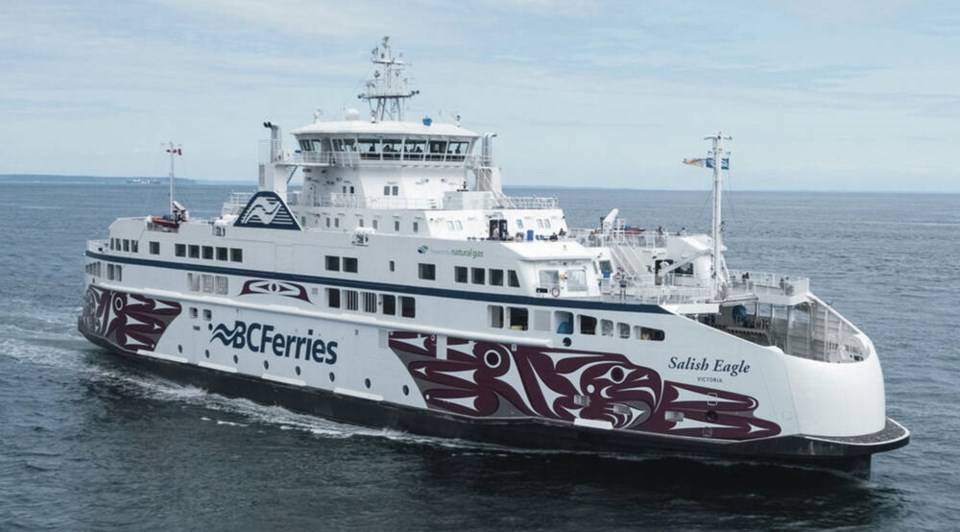Imagine a future where BC Ferries runs a speedy little passenger service between downtown Vancouver and Victoria, letting you catch a concert, hockey game or quick vacation, hassle-free. Where its terminals have no line-ups, its fleet has no emissions, its ships run on time, and people with bikes and pets aren’t forced to huddle outside under the terminal pylons in the cold rain.
Toss in a fully-stocked buffet and functional WiFi and it sounds like a marine travel utopia.
Those are the kinds of ideas BC Ferries CEO Nicolas Jimenez says he’s looking for this fall, when he opens public consultation on a vision for the corporation’s future.
“As we envision the ferry system for the next generation, we know that we are faced with strategic questions about where we sail, how often we sail, the types of fuel we consume, our environmental footprint and our fiscal security,” Jimenez told attendees at BC Ferries AGM last week.
“How will people travel in the future? Do we need as much deck space for single-occupancy vehicles? How will BC Ferries reduce its carbon intensity, all while accommodating the increased number of people who want to walk on and cycle and transit to get to our terminals?
“These are just a few of the future-focused questions that we're considering. We don't all have all the answers right now and we will be engaging British Columbians to help us take part in this conversation.”
Jimenez will have no problem getting public feedback on BC Ferries this fall. If there’s one thing British Columbians like to do, it’s to complain about the ferry system. And there’s no shortage of legitimate complaints to go around, after a summer of broken ships, website glitches, long delays and cancelled sailings.
All of that makes it a bit harder to imagine a future BC Ferries, when the current version is such a mess.
Those kinds of dichotomies are everywhere around BC Ferries these days.
Its AGM was an attempt by corporate leadership to simultaneously celebrate record ridership while also apologizing for record public unhappiness with sub-par service. Profits are up, but so are late sailings and cancellations. A hiring blitz has slowed a critical staff shortage, but a series of unanticipated breakdown of ships has created a crisis of another kind. Everywhere you turn, any good news at BC Ferries is offset by bad.
“While there have been some service challenges, we acknowledge, the real story is the surge in the demand for fiscal service,” said BC Ferries board chair Joy MacPhail, attempting to apply some spin to the narrative on behalf of the corporation.
“In the last fiscal year, BC Ferries carried more than nine million vehicles, which is an all-time record.”
The figure is impressive. More people now travel on BC Ferries in a year than fly out of Vancouver International Airport — one of the largest airports in North America.
The sheer volume of people using a ferry system designed and built decades ago, for half that capacity, is a big part of the problem.
Another major issue is a provincial government that pitches in only one-quarter of the revenue for BC Ferries, but refuses to allow the other three-quarters of revenue (from fares) to increase to necessary levels, for fear of political backlash.
That financial straitjacket is one Jimenez is trying to at least loosen within the next year. The goal, he said, is to present the government with a fully-formed plan for the next few decades of BC Ferries, along with the costs, revenue sources and investment required by provincial taxpayers to create a ferry service that meets expectations.
“We've advanced as you know, a $5.2 billion capital plan and that capital plan will be informed in part by the visioning process that we will take but also by the very real needs of the business that we have today,” he said.
It’s a lot. Solve today’s problems, predict tomorrow’s problems, cast out for future problems and then present a plan to government to address those too.
But nobody said being BC Ferries CEO was easy. Then again, these days, with all the delays and cancellations, it’s not easy being a BC Ferries customer either.
Rob Shaw has spent more than 15 years covering B.C. politics, now reporting for CHEK News and writing for Glacier Media. He is the co-author of the national bestselling book A Matter of Confidence, host of the weekly podcast Political Capital, and a regular guest on CBC Radio. [email protected]







